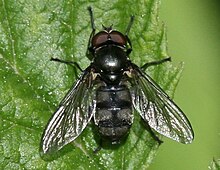Portevinia maculata
| Portevinia maculata | |
|---|---|

| |
| Portevinia maculata (male) | |

| |
| Portevinia maculata (female) | |
| Scientific classification | |
| Domain: | Eukaryota |
| Kingdom: | Animalia |
| Phylum: | Arthropoda |
| Class: | Insecta |
| Order: | Diptera |
| Family: | Syrphidae |
| Genus: | Portevinia |
| Species: | P. maculata |
| Binomial name | |
| Portevinia maculata (Fallén, 1817) | |
Portevinia maculata, also known as the ramsons hoverfly, is a European species of hoverfly. The adults can be found around Allium species when the plants are in flower (May–June). The larvae tunnel through and overwinter in the bulbs of this plant.[2]
Description
External images
For terms see Morphology of Diptera
Tergites 2-4 with grey spots. Face very concave for upper two-thirds. Antennae red.
See references for determination[3][4][5][6]
Distribution
Palearctic Southern Norway to North Spain. Ireland East into Northern Europe and Central Europe as far as Liechtenstein, Austria and northern Italy. [7][8]
It can be found in the following countries: Austria, Belgium, Czechia, Denmark, France, Germany, Ireland, Italy, Liechtenstein, Montenegro, Netherlands, Norway, Poland, Romania, Slovakia, Spain, Sweden, Switzerland, Ukraine and the United Kingdom.[1]

Habitat
Portevinia maculata lives in deciduous woodland glades where Allium ursinum or Allium triquetrum also grow.[9] It can be found at elevations up to 2000 metres above sea level.[1]
References
- ^ a b c "Ramson's Hoverfly". www.iucnredlist.org. 2021-02-22. Retrieved 2022-05-18.
- ^ Stubbs, Alan E.Carl Fredrik Fallen & Falk, Steven J. (1983). British Hoverflies: An Illustrated Identification Guide. British Entomological & Natural History Society. p. 267, xvpp.
- ^ Van Veen, M. (2004) Hoverflies of Northwest Europe: identification keys to the Syrphidae. 256pp. KNNV Publishing, Utrecht.addendum
- ^ Van der Goot,V.S. (1981) De zweefvliegen van Noordwest - Europa en Europees Rusland, in het bijzonder van de Benelux. KNNV, Uitgave no.32: 275pp. Amsterdam.
- ^ Bei-Bienko, G.Y. & Steyskal, G.C. (1988) Keys to the Insects of the European Part of the USSR, Volume V: Diptera and Siphonaptera, Part I. Amerind Publishing Co., New Delhi. ISBN 81-205-0080-6.
- ^ Coe, R.L. (1953) Diptera: Syrphidae. Handbks.ident.Br.insects, 10(1): 1-98. R.ent.Soc.London. pdf
- ^ Fauna Europaea
- ^ Peck, L.V. (1988) Syrphidae. In: Soos, A. & Papp, L. (eds.) Catalogue of Palaearctic Diptera, 8: 11-230. Akad.Kiado, Budapest.
- ^ Speight, M.C.D. (2011). "Species accounts of European Syrphidae (Diptera)" (PDF). Syrph the Net, the Database of European Syrphidae. 65: 285pp.

